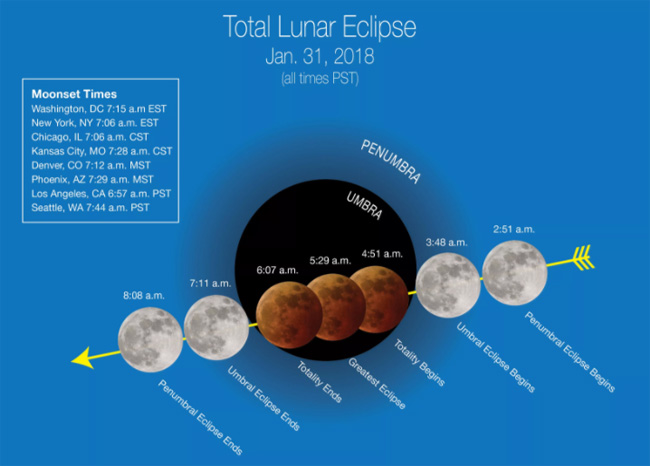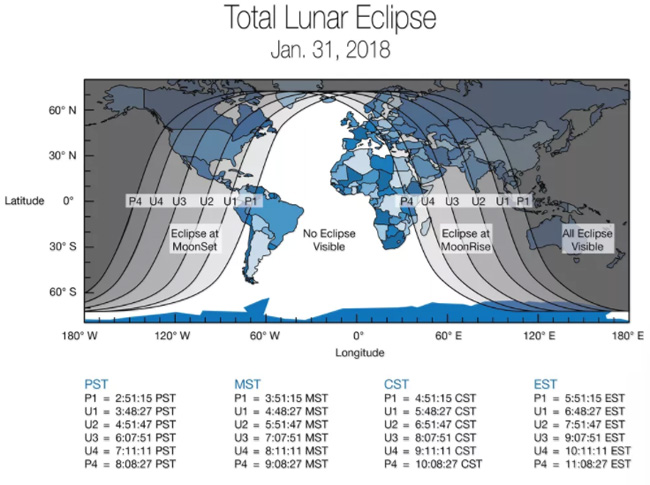How to directly see the phenomenon of super moon, blue moon and eclipse converging after more than 150 years
- Why is the moon glowing?
- Top 10 interesting facts about the Moon you may not know
- Do you know the full moon may be the reason why you don't sleep well?
Astronomers will enjoy a sumptuous party on January 31, 2018, tomorrow when three rare phenomena are super moon, blue moon and total eclipse. Below is a way to see directly the phenomenon of super moon, blue moon and eclipse converging after more than 150 years . Invite you to consult!
According to EarthSky.org, even if the super moon does not happen, this will be the first time that the full moon of the blue moon and the lunar eclipse appears in the sky in the US since March 1866.
 This NASA chart shows the period of eclipse in the United States.Photo source: NASA
This NASA chart shows the period of eclipse in the United States.Photo source: NASA
- What is super moon? Vietnam will welcome super moon at any time in 2018?
January 31, 2018 (tomorrow) will be a rare occasion for photographers and astronomers, when at the same time three phenomena of super moon, blood moon and blue moon converge in the full moon that night. This is a very special event that has never happened in the past 150 years called "super blue blood moon" (roughly translated: 'Super blue blood moon'). It means:
- Super moon or a full moon is a phenomenon that occurs when the full moon is at the closest point to the Earth in its orbit. The moon will be located from 358,994 kilometers from the Earth, instead of the usual distance of 384,400 kilometers. According to NASA, this will make the super moon look 14% larger and 30% brighter than the full moon at the farthest point in orbit around the Earth.
- It was the second full moon day of the month, known as a ' blue moon' . This does not make it different, but just a coincidence in the calendar that creates an extremely rare event.
- During the eclipse, the moon turns red because light from the sun is obscured by the Earth. This explains why the whole lunar eclipse is also called 'blood moon'.
Usually it is not so easy to encounter this phenomenon, so this is probably the lucky phase of moon lovers.
Location and time of observation
NASA said the total lunar eclipse could be observed in the early morning of January 31 from North North America through the Pacific Ocean and to eastern Asia.
The lunar eclipse will start from 6: 48 minutes on January 31 (international time) and peak at 8:30. People in East Asia, the Pacific and West North America can observe this phenomenon well, and people in East North America and Europe can only see the partial eclipse.
According to Sky and Telescope magazine, the lunar eclipse will last nearly three and a half hours. In Vietnamese time, it will start at 18 hours 48 minutes and end at 22:12. The phenomenon will converge in 77 minutes, from 19: 51 minutes to 21: 08 minutes tomorrow, January 31, 2018.
But unfortunately, because not everyone can observe this rare phenomenon directly.
 This is the time when celestial reality appears in the world.Photo source: NASA
This is the time when celestial reality appears in the world.Photo source: NASA
How to view online
You can watch it live at:
- NASA TV online feed (https://www.nasa.gov/nasalive).
- The Griffith Observatory in Los Angeles also aired directly at this rare phenomenon (https://livestream.com/GriffithObservatoryTV/LunarEclipseJanuary2018).
Refer to some more articles:
- Admire the beautiful super moon image in the sky of Vietnam and the world
- Why is the Moon red like blood when the total lunar eclipse occurs?
- Top 10 most rare and beautiful astronomical phenomena
Having fun!
You should read it
- ★ Do you know what a solar eclipse looks from the Moon?
- ★ Why is the Moon red like blood when the total lunar eclipse occurs?
- ★ The biggest super moon in 70 years will appear on November 14
- ★ Top 10 most rare and beautiful astronomical phenomena
- ★ Don't miss the biggest super moon view in 2017 in the afternoon and tonight, Vietnam can see it